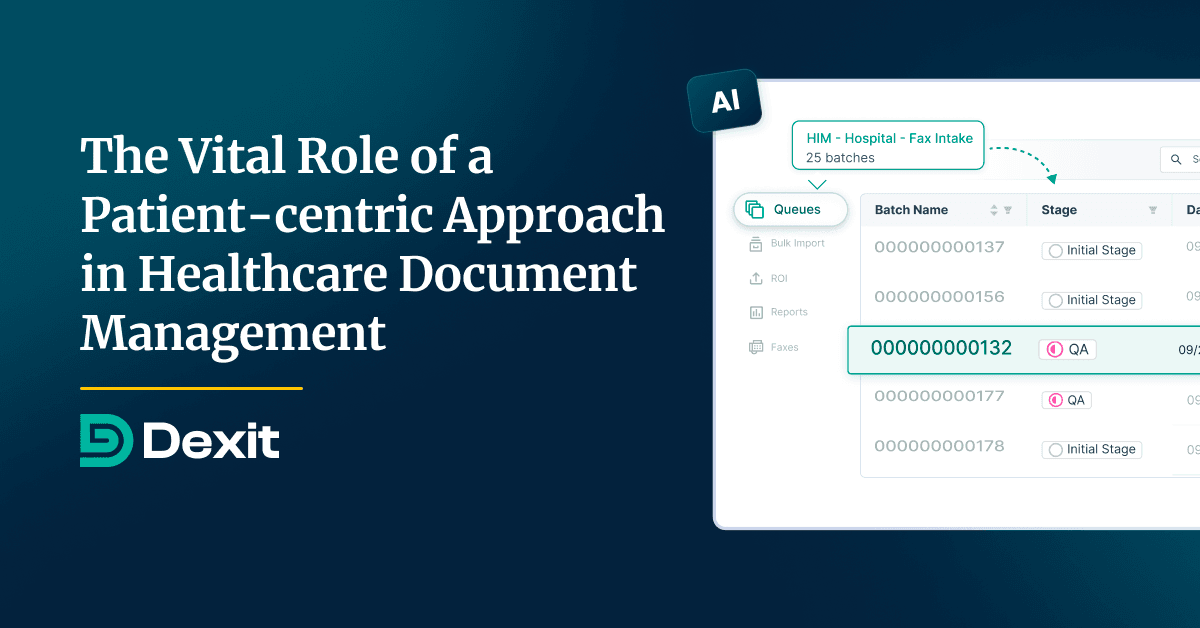
Digital Transformation in Healthcare - The Role of Document Management Systems
In the rapidly evolving healthcare landscape, transforming traditional paper-based workflows into digital is …

The adoption of a patient-centric approach in healthcare document management is a crucial aspect as technological advancements and patient expectations are continually redefining the healthcare landscape.
A patient-centric approach simply means placing patients at the heart of healthcare processes. This ensures the patient's needs, preferences, and individual conditions play a vital role in guiding the creation, management, and sharing of medical documents and records.
Why choose a patient-centric approach for managing healthcare documents?
Could investing in a good Document Management System (DMS) boost how well this approach works?
This article not only answers the above questions but also explores the benefits, challenges, and transformative potential this approach holds for the future of healthcare document management delivery.
Explore:
Healthcare document management poses several challenges due to the sheer volume of paperwork generated in healthcare settings, the need for strict adherence to privacy regulations like HIPAA, and the necessity for efficient access to patient information. Some of the critical challenges include:
By placing patients’ needs and preferences first, healthcare providers can streamline the management of medical records, enhance the security and accessibility of sensitive information, and facilitate better communication across various healthcare services.
This approach can lead to more effective coordination of care, as all pertinent patient information is organized and readily available for healthcare professionals when making critical medical decisions.
Some of the ways a patient-centric approach can handle healthcare document management challenges include:
Implementing a patient-centric approach in healthcare document management involves prioritizing the needs and preferences of patients throughout the entire process of managing their medical records and information.
Here are some strategies to achieve this:
By implementing these strategies, healthcare organizations can effectively prioritize the needs and preferences of patients in document management processes, ultimately improving the overall quality of care and patient satisfaction.
The implementation of a robust Document Management System (DMS) stands out as a cornerstone in transitioning towards patient-centric healthcare delivery. At its heart, such a system not only streamlines the archival and retrieval of patient records but also fortifies the privacy and security of sensitive medical information.
A well-integrated DMS facilitates seamless coordination among healthcare professionals by providing real-time access to accurate patient data, leading to more informed decision-making and, ultimately, enhancing the quality of care.
This approach to document management spares patients the redundancy of repeat tests and the risk of medical errors, thereby fostering a healthcare environment that prioritizes their needs and comfort.
A modern AI-powered DMS can further streamline this process. For instance, in Dexit - a HIPAA-compliant healthcare DMS, its AI-powered patient-document matching feature helps eliminate reliance on barcodes and other manual patient-matching techniques.
This not only ensures efficiency and accuracy but also helps healthcare providers focus on their primary job, which is patient care, and less on the administrative burden of manual techniques.
Here are some ways in which a good Document Management System (DMS) can create an impact on patient-centric healthcare document management:
Join over 3,200 subscribers and keep up-to-date with the latest innovations & best practices in Healthcare IT.

In the rapidly evolving healthcare landscape, transforming traditional paper-based workflows into digital is …

In the ever-evolving landscape of healthcare document management, customization is the key to efficiency. …

Managing healthcare documentation is one of the most time-consuming and error-prone tasks in the industry. …